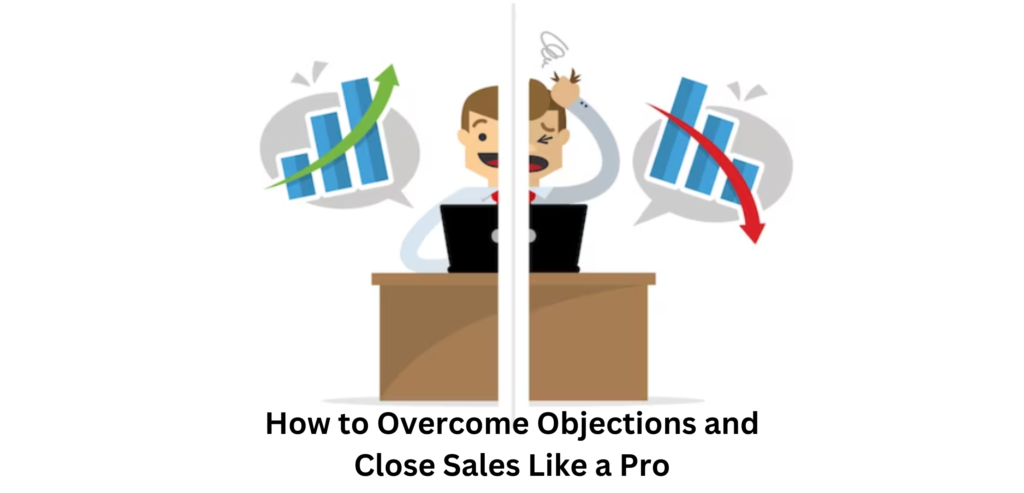If you’re in Overcome Objections Sales, you know that dealing with customers’ concerns is inevitable. This, however, is no reason to allow them to impede your ability to close agreements. You can utilize objections to your advantage if you know how to overcome them.
Four tried-and-true methods for getting over sales obstacles are detailed in this article. I’ll throw in some industry stats, a quotation to inspire you, and SEO-friendly text for added deal-closing power.

Stay Informed by Paying Close Attention to the Critique
To overcome a prospect’s resistance, you must first listen carefully and note what they say. Stop sitting around and wait for someone to speak. Instead, please pay attention to the prospect’s words and the reason behind their objection.
You may tackle the objection directly when you grasp what it is.
Put the Critique into Your Own Words
It could be useful to rephrase the objection when you have grasped its meaning. This demonstrates to the potential customer that you have been paying attention and are serious about addressing their problems.
Additionally, it provides an opportunity to address any confusion.
Get to the Heart of the Matter
All too often, the prospect’s concern isn’t the real issue. For instance, a potential customer may complain, “Your product is too expensive,” while their main concern is uncertainty about whether or not your solution would address their issue.
To get to the bottom of an objection, you must do some digging. You will be better able to resolve the problem after you identify it.
Propose an Alternative: Overcome Objections Sales
To overcome sales objections, delve into the issue’s core. Then, offer a tailored solution. This may involve providing more information or even suggesting a discount. Flexibility and collaboration are key. Show a willingness to adapt to the prospect’s needs. This approach addresses their concerns. It also strengthens the likelihood of closing the sale. It demonstrates your commitment to finding a beneficial solution.

Data analysis: Overcome Objections Sales
- HubSpot says nearly half of all sales agreements fall through because of obstacles.
- Daily, a salesperson encounters ten objections.
- 27% of salespeople can successfully overcome objections.
- Improving Your Abilities
Listening attentively
Salespeople must have good listening skills to comprehend the prospect’s worries and objections. It entails not interrupting the prospect while they are speaking and actively listening to what they say.
Feelings of compassion
Putting oneself in the customer’s shoes is a crucial skill for salespeople. This necessitates empathizing with the prospect and learning their motivations for voicing their opposition.
Solving problems
Salespeople should have the problem-solving skills to help prospects. Providing solutions that satisfy the prospect’s demands requires a comprehensive grasp of those needs.
Discussion of terms
Negotiation skills are essential for salespeople. Working with others to reach solutions that work for everyone is necessary.
Feeling secure
Confidence in one’s capacity to overcome objections is crucial for sales professionals. This requires self-confidence and the ability to explain the benefits of the service or product to the potential customer.

Overcome Objections Sales Questions
Prospective buyers will always have concerns in the sales industry. Nevertheless, skillfully addressing fears is an essential competency that may greatly influence transaction closure and the development of solid client relationships. If you want to know how to overcome obstacles in sales, you should read the commonly asked questions that follow. If you’re going to succeed in sales, knowing these tactics can help you handle objections professionally and pleasantly.
In sales, how do you expertly respond to customer concerns?
Listening carefully, comprehending the customer’s worries, sympathizing with their perspective, and responding intelligently to manage sales objections successfully are essential. Recognizing concerns in a positive light, responding with pertinent information or solutions, and leading the conversation toward a win-win result are all part of a professional approach.
When dealing with objections, what are the four P’s?
When dealing with sales objections, remember the “4 P’s”:
- Pause: When someone objects, first pause before responding. This shows that you are considering the objection instead of reacting.
- Probe: Ask questions to understand the root of the objection. This involves active listening and seeking clarification. It’s important to comprehend the prospect’s concerns or issues.
- Paraphrase: Once you understand the objection, paraphrase it to the prospect. This demonstrates that you’ve listened to and understood their point of view. It ensures there’s no miscommunication.
- Propose: After clarifying the objection, propose a solution or a response. Your solution or response should address the concern. This should be a thoughtful and tailored response. It should show how your product or service can solve the issue.
What strategies do Overcome Objections Salespeople employ?
To overcome objections, salespeople need to use a strategic approach. This includes actively listening, understanding the customer’s feelings, giving them the information they need, addressing their worries directly, and coming up with alternatives or solutions highlighting the product’s worth. Successfully navigating obstacles and closing negotiations also requires developing rapport and trust.
What is your approach to professionally and constructively addressing consumer objections?
Professionally and politely handling consumer issues requires empathy and respect. Recognize the customer’s worries without brushing them off, answer their questions accurately, propose solutions that meet their requirements, and highlight the product’s worth without being overbearing.
List the three main categories of objections.
There are typically three types of objections in sales:
- Problems with the Product or Service: Issues with the product’s characteristics, quality, or appropriateness.
- Issues with the offering’s price or value proposition are known as price objections.
- Problems with the procedure, the schedule, or any particular terms and conditions linked to the transaction may give rise to process or timing objections.
How do I overcome sales objections? What are the five steps?
To get beyond a salesperson’s resistance, use these five steps:
- Engage Your Audience: Listen carefully to the objection and determine why it has merit.
- Please take note of the customer’s concern and respond appropriately.
- Provide more information and ask questions: To understand the objection better, ask pertinent questions.
- When faced with an objection, it’s important to respond with knowledge, answers, or alternatives that successfully address the problem.
- After addressing the customer’s problems and providing them with the information or solution, it is important to confirm their understanding.
Suppose you want to handle sales objections properly. In that case, you must communicate effectively, understand the client’s demands, and provide individualized solutions to make the transaction go well and leave the customer happy.
Boost Your Productivity!
Join our weekly newsletter for top time management tips and productivity strategies. Subscribe now for the latest insights and a special bonus guide: How to Overcome Objections and Close Sales Like a Pro.





